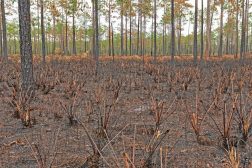Definition
noun
(ecology) The progressive succession of a community or group of species in an ecosystem over time
Supplement
Ecological succession refers to the progressive succession of a group of species or community over time. In this regard, there is usually one dominant type of species or community thriving in an ecosystem and where a stable climax community is established. An ecological succession may span decades or millions of years. The word succession was first used by the French naturalist Adolphe Dureau de la Malle to refer to the vegetation development after forest clear-felling.
Ecological succession has an essential role in changing the composition or structure of a community. For instance, a new community of forest trees introduces shade to its ecosystem, or a previous community of vegetation that changed the fertility of the soil.
Succession may arise from the formation of new, unoccupied habitat (e.g. a lava flow or a severe landslide). This kind of succession in which the sequential development of plant or animal communities in an area where no soil initially exists is called primary succession. Succession may also be initiated by a disturbance of an existing community (e.g. fire, severe windthrow, logging). This kind of succession where communities develop in areas where soil already exists is called secondary succession.
Word origin: Latin successio
See also:
- climax community
- ecological stability
- primary succession
User Contributions / Comments:
- The constant changing of advancing communities until reaching a climax community
– by Snede122



